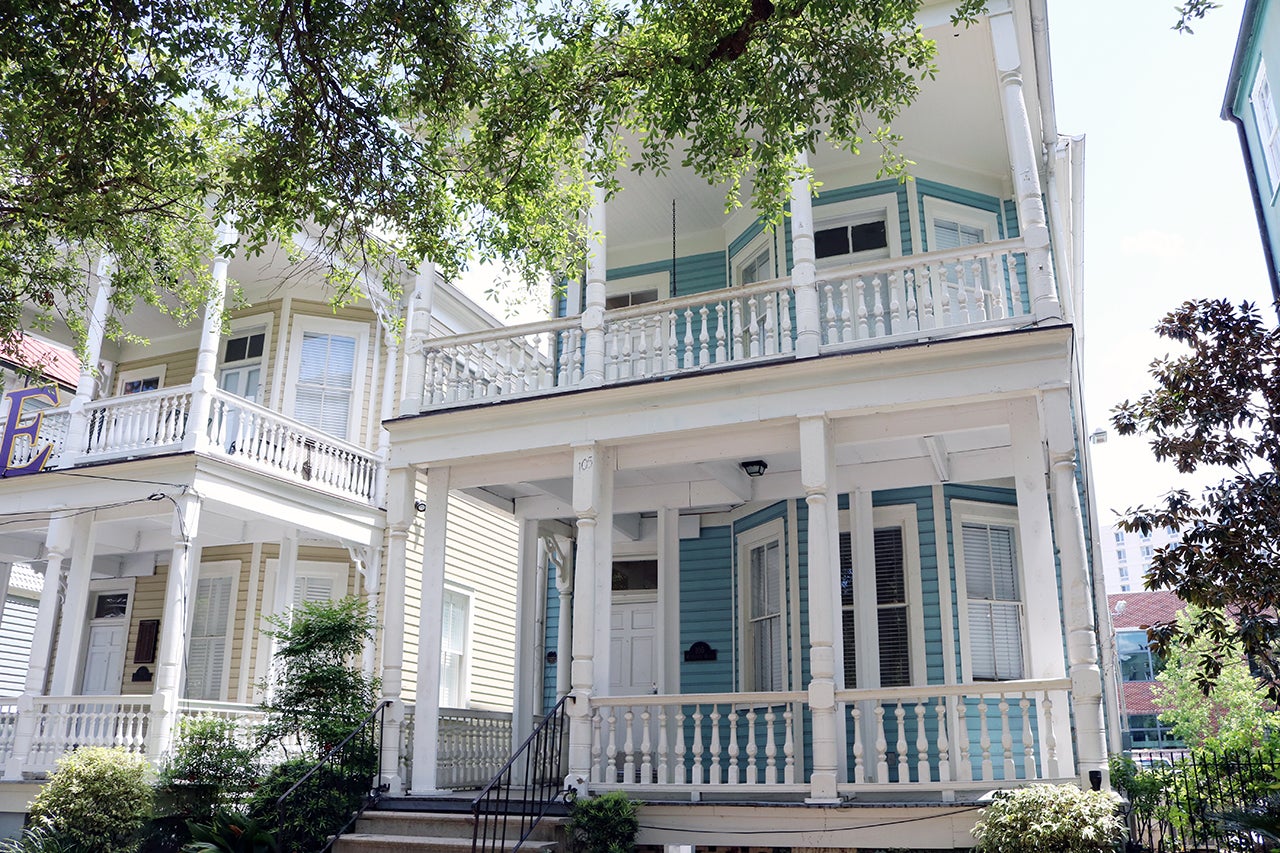South Carolina Teaching Fellows Ridgeland Welch and Aly Lain were deep in a discussion about education in the civil rights era during their Foundation of Education class when professor Jon Hale mentioned that Septima Poinsette Clark, a nationally known civil rights leader, education advocate and freedom fighter, was born at a location now embedded within the College of Charleston campus.
The two students immediately wondered why there was no historic marker in front of her birthplace at 105 Wentworth St. Charleston has the Septima Clark Parkway (U.S. Highway 17) that people drive over daily, and her burial spot is well-marked at Old Bethel United Methodist Church Cemetery. Why wouldn’t there be a marker to celebrate her birthplace?
With the support of Hale and Mary Ann Hartshorn, visiting assistant professor and director of the College’s Teaching Fellows & Teacher Cadet Program, Welch and Lain got the ball rolling. Two years later with the collaboration of more than 100 teaching fellows, School of Education, Health, and Human Performance Dean Fran Welch, faculty and politicians, along with many fundraisers, the historic marker and a portrait of Clark will be unveiled this Thursday, May 3, 2018.
The event, says Lain, will commemorate the life and legacy of a woman who made a positive impact on so many lives.
“We feel strongly about this marker for Clark because we believe in the power of telling stories; the stories we encounter have a great power to inspire us. And that’s what Clark’s story has done for us,” says Lain. “Clark was a woman from Charleston who did not have to do anything, but she chose to do everything. She chose to speak out and demand equal treatment, she chose to educate others to stand up for their rights, she chose again and again to advocate for equity in every way. Her story is one of exceptional power, and we believe she is a figure who can motivate us all to search for our own ways to support equality in all things.”
Clark contributed in a variety of ways to the civil rights movement. She created and led the Citizenship School program, which educated nearly 10,000 African-Americans to pass discriminatory voting tests. As a teacher, she also saw education as a means to freedom and worked with all people to become students of freedom and active change agents, says Hale. She also mentored Rosa Parks and Martin Luther King, Jr.
Recognizing Clark’s birthplace is important, says Hale, because it “actively addresses the oversight of African- American and civil rights history in Charleston.”
Hale, whose speciality is the history of American education during the civil rights movement, adds, “The marker makes visible a contribution and a rich history that is often ignored by sanitized versions of history put forth in Charleston’s tourist economy. It also reminds students and educators that our city has a proud history of education activism and people like Ms. Clark have successfully challenged the city to better meet its responsibilities in providing a quality education.”
May 3 marks the 120th anniversary of Clark’s birthdate, so it’s only fitting that it serves as the date of the historic marker dedication. At the unveiling, Charleston Mayor John Tecklenburg will issue a proclamation in Clark’s honor, and Charleston’s poet laureate Marcus Amaker will read a poem written especially for the occasion. The dedication will take place at 105 Wentworth St. at 10 a.m. and is free and open to the public.
Thursday afternoon at the College of Charleston’s Hill Gallery on the first floor of the Cato Center at 161 Calhoun St., a portrait of Clark by famed Charleston artist Jonathan Green will be unveiled. The portrait will ultimately be housed at the Avery Research Center where Clark studied when it was the Avery Normal Institute. Gretchen Morgan, Gamma Xi Omega chapter president of the CofC Alpha Kappa Alpha Sorority, Inc., will also speak about Clark, who was a sorority sister. The portrait reception, which is free and open to the public, begins at 4 p.m.
Language on the Historic Marker:
Septima Poinsette Clark, who Martin Luther King Jr. called “the Mother of the Movement,” was a nationally influential Civil Rights activist. She was born at 105 Wentworth St. on May 3, 1898, to Peter Poinsette, former slave, and Victoria Anderson, who was of Haitian descent. Clark earned her teacher’s certificate from Charleston’s Avery Normal Institute and her master’s from Hampton Institute. She taught for nearly 40 years.
In 1953, Clark visited the Highlander Folk School in TN, which was dedicated to training community organizers and pursuing equality for all. Here she developed the “citizenship school” model, which promoted literacy and political education. By 1965 Clark had helped to organize nearly 900 citizenship schools, including the first one on nearby Johns Island, and had helped register more than 50,000 Black voters.
Featured image: Septima Clark’s birthplace at 105 Wentworth St. across from the College of Charleston campus.





